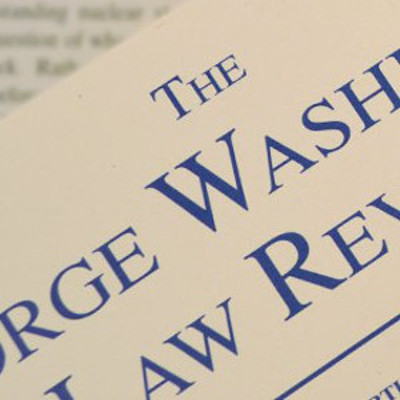The “Narrow” Interpretation of the Computer Fraud and Abuse Act: A User Guide for Applying United States v. Nosal
Jonathan Mayer 84 Geo. Wash. L. Rev. 1644 Over the past decade, courts have radically reshaped the landscape of federal computer crime law. Through a set of innovative interpretive maneuvers, the judiciary has both greatly clarified and sharply narrowed the scope of Computer Fraud and Abuse Act (“CFAA”) liability. This “narrow” CFAA doctrine is winning... Read More
Authority and Authors and Codes
Michael J. Madison 84 Geo. Wash. L. Rev. 1616 Contests over the meaning and application of the federal Computer Fraud and Abuse Act (“CFAA”) expose long-standing, complex questions about the sources and impacts of the concept of authority in law and culture. Accessing a computer network “without authorization” and by “exceeding authorized access” is forbidden... Read More
A Proposed Amendment to 18 U.S.C. § 1030—The Problem of Employee Theft
Michael L. Levy 84 Geo. Wash. L. Rev. 1591 The problem of what constitutes “unauthorized access” and “access in excess of authorization” to a protected computer under 18 U.S.C. § 1030 is proving to be intractable. At the same time, businesses are experiencing significant losses, as disloyal employees, on their way to new employment, take... Read More
Measuring Computer Use Norms
Matthew B. Kugler 84 Geo. Wash. L. Rev. 1568 Unauthorized use of computer systems is at the core of computer trespass statutes, but there is little understanding of where everyday people draw the line between permissible and impermissible computer use. This Article presents a study that measures lay authorization beliefs and punishment preferences for a... Read More
Trespass, Not Fraud: The Need for New Sentencing Guidelines in CFAA Cases
Orin S. Kerr 84 Geo. Wash. L. Rev. 1544 This Article argues that the existing regime for sentencing violations of the Computer Fraud and Abuse Act (“CFAA”) is based on a conceptual error that consistently leads to improper sentencing recommendations. The Federal Sentencing Guidelines treat CFAA violations as economic crimes. Most CFAA crimes are rooted... Read More
The Ninth Circuit’s Deficient Examination of the Legislative History of the Computer Fraud and Abuse Act in United States v. Nosal
William A. Hall, Jr. 84 Geo. Wash. L. Rev. 1523 In United States v. Nosal, the Ninth Circuit held that the government may not prosecute certain cases under the Computer Fraud and Abuse Act (“CFAA”) where a computer was accessed by a user with some right of access (i.e., an insider) for a prohibited purpose.... Read More
Consenting to Computer Use
James Grimmelmann 84 Geo. Wash. L. Rev. 1500 The federal Computer Fraud and Abuse Act (“CFAA”) makes it a crime to “access[] a computer without authorization or exceed[] authorized access.” Courts and commentators have struggled to explain what types of conduct by a computer user are “without authorization.” But this approach is backwards; authorization is... Read More
A Trespass Framework for the Crime of Hacking
Josh Goldfoot & Aditya Bamzai 84 Geo. Wash. L. Rev. 1477 Computer crime statutes prohibit accessing a computer without “authorization.” In recent years, this element has attracted considerable controversy, with some courts expressing concern that “authorization” is so indeterminate that the Computer Fraud and Abuse Act (“CFAA”) is void for vagueness. This Article argues that... Read More
A Code-Based Approach to Unauthorized Access Under the Computer Fraud and Abuse Act
Patricia L. Bellia 84 Geo. Wash. L. Rev. 1442 Thirty years ago, Congress passed the Computer Fraud and Abuse Act (“CFAA”) to combat the emerging problem of computer crime. The statute’s core prohibitions targeted one who “accesses” a computer “without authorization” or who “exceeds authorized access.” Over time, the incremental statutory changes and large-scale technological... Read More
Keynote Address – Hacking into the Computer Fraud and Abuse Act: The CFAA at 30
Senator Sheldon Whitehouse 84 Geo. Wash. L. Rev. 1437 It is a pleasure to be here today to participate in a discussion about the future of the Computer Fraud and Abuse Act (“CFAA”). Now in its thirtieth year, the CFAA has never been more important or controversial than it is today. As a nation, we... Read More

